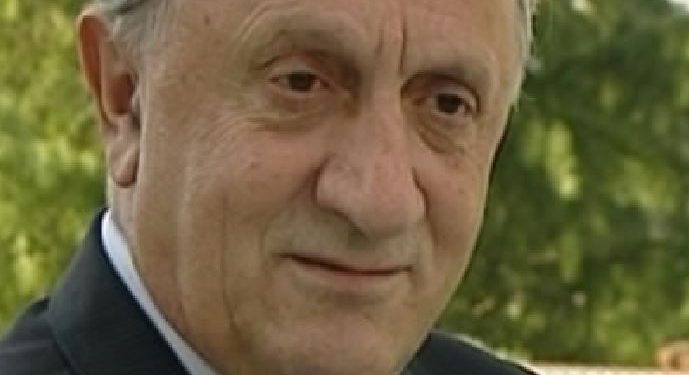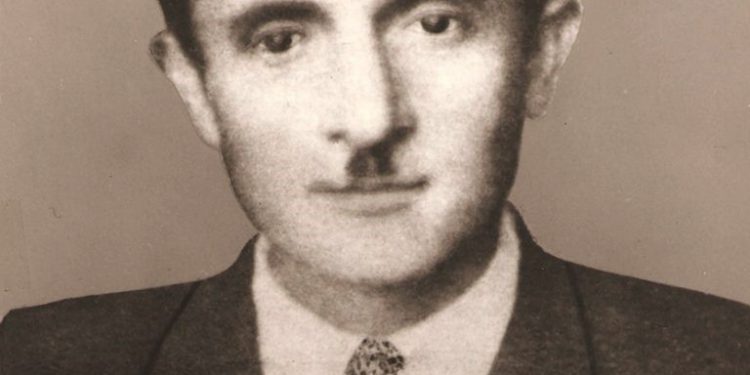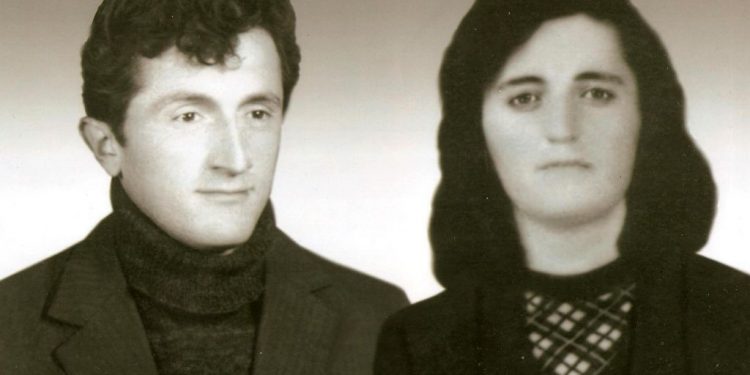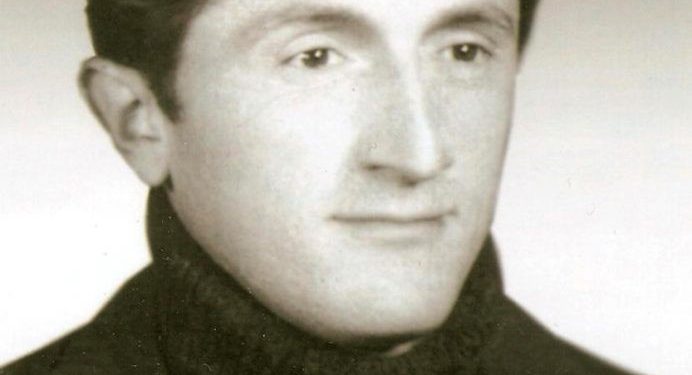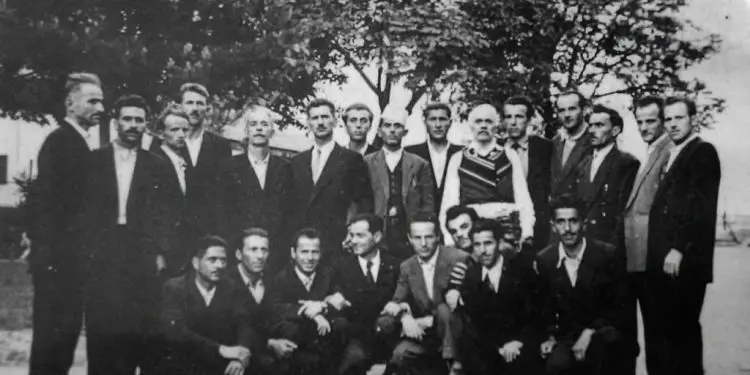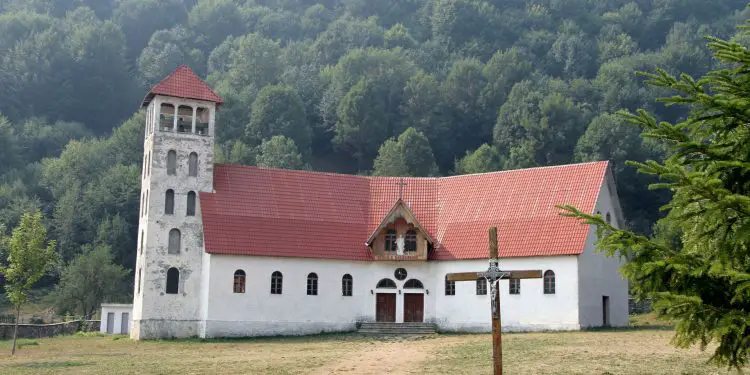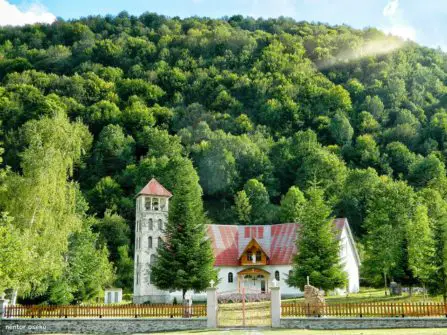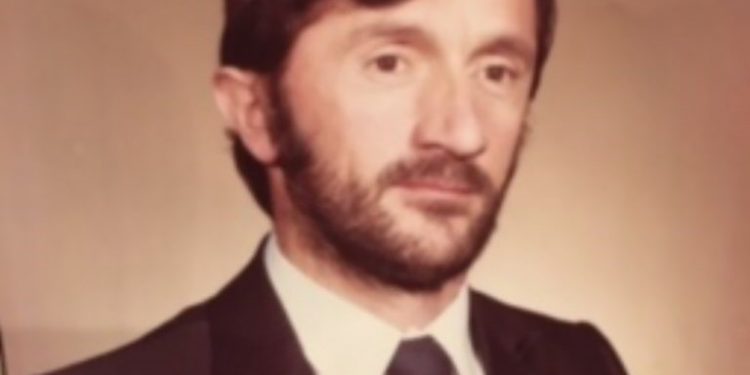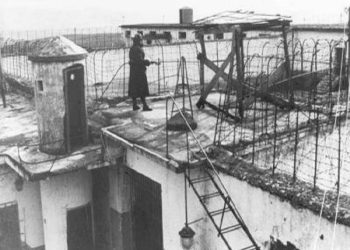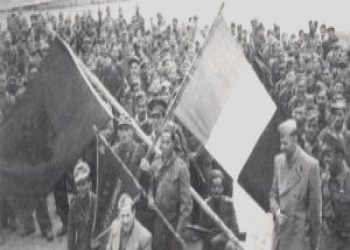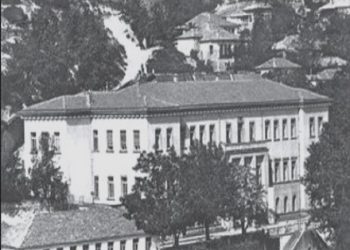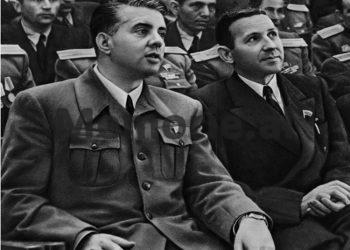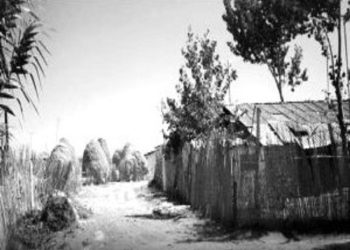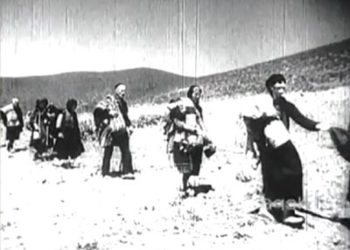By Nikoll Hysaj
Memorie.al publishes the memoirs of Nikol Pjetër Hysaj (Gjeka), originally from Vermoshi and living in Michigan, USA, where he settled since 1978 when he was forced to flee Albania due to the savage persecution of the communist regime against the most families. patriotic honors of Vermoshi, to him personally and to his family, as he was unjustly accused that his father, Pjetër Gjeka, was the perpetrator of the murder of Nik Pjetër Ndreka, his cousin, whom the regime declared the People’s Hero killed “saboteur gangs”. From the horrors they experienced in the Tepelena camps the whole list of names of families from Vermoshi who were executed with and without trial, as well as those who were imprisoned, interned, or fled Albania.
I have lived in the state of Michigan in the USA for 38 years. In the past and currently I have followed and follow closely all the political-economic and social developments of the Albanian territories. Before the 1990s, Albanian emigrants, especially those who left Albania for political reasons, had great difficulty connecting with the families of relatives we had left in the Homeland. These and other difficulties came from the fact of self-isolation and dictatorship consolidated by the communist regime in Albania, not only with us emigrants and the outside world, but also among the Albanians themselves living in Kosovo, Montenegro, Macedonia and Chameria, these inhumane acts that have brought incalculable damage to the Albanian nation. These and other difficulties that we encountered in our long life in emigration, thank God, ended once and for all in 1990 with the overthrow of the totalitarian communist regime in Albania and the developments in the field of technology in creating a global world, us have given us the opportunity to follow the real life that takes place in all areas where Albanians live in the Balkans. Recently I have closely followed the debates that have taken place in TV studios, many articles, speeches, debates and comments that have been made in newspapers and media portals in Albania about concentration camps and especially Tepelena where she has been interned for 5 years. my mother with family. For years we have waited that not only the Albanian state, political parties, associations, historians, civil society, but also the persecutors themselves should have reflected and contributed many years ago to the professional documentation of crimes committed during the communist regime, to occupy the deserved place in the History of Albania, serving the generations to come. Often this topic from different media is realized as a media show. Thus, the tunnel looks like endless.
With the overthrow of the communist regime and the establishment of democracy in Albania, we gained our legitimate rights not only in the strata of the politically persecuted, but also the persecutors with their heirs, won all Albanians wherever they are. Thus, democracy gave the opportunity again to that layer of the communist regime to be an active participant in all areas of the country’s life. We, the strata of the persecuted, although persecuted, interned, imprisoned, shot and killed without trial and without guilt, FORGIVE. When I hear, I look and I read with my ears and eyes; historians, analysts, politicians, journalists and especially those who represent the layer of the former communist regime, I do not feel well, I am hurt and I do not believe that for 28 years these people have not benefited from this intellectual layer of Albanian society, at least a little culture and democratic spirit that when discussing the crimes of dictatorship against women and children are more humane and minimally tell the truth.
I am very worried because even though almost 30 years have passed since the overthrow of the dictatorial regime, we in the ranks of the politically persecuted have not been institutionally apologized for the crimes committed against us. Unfortunately, the strata of the politically persecuted in Albania have been misused for political and party interests, so the representatives of the Albanian political class have not yet distanced themselves and are not aware of the crimes that the communist dictatorial regime of Enver Hoxha has committed against Albanian nationalist strata. This is also confirmed by the fact of non-timely compensation of the politically persecuted, who are deliberately kept dependent on Albanian politics by its interest and especially the irresponsibility of how to speak and how to deal with those crimes nowadays that is also the object of this writing.
Pëllumb Xhufi, and the “blind” historians of the old courtyard
A few months ago, the well-known historian in Albania, Mr. Pëllumb Xhufi, in a TV show, among other things, said that it is “banal” to compare the Tepelena camp with the Nazi concentration camps. Although Mr. Xhufi after the 1990s has been positioned as a politician of the Albanian left, I have always followed him with special attention and respect in television shows, in terms of addressing the historical issues of his field, especially the figure of Skanderbeg and Mother Teresa, as well as the genocide of the Greek army in southeastern Albania. For these expressions Mr. Xhufi was criticized in all Albanian media. In his statement, after serious criticism of you, he not only did not reflect and did not apologize for what he had said wrong, but instead took on the role of advocate of the crimes of communism. This shows that Mr. Xhufi and other Albanian historians, although described as professionals, cannot break away from partisanship and consequently unfortunately blame themselves as; “Blind historians of the old courtyard.”
To give an answer only with facts to Mr. Xhufi and others who think and judge like him, before referring to my family, Hysaj, and my village Vermoshi, I will thank any Albanian or foreigner whether in respects and contributes in any way or form to the preservation of the history of the politically persecuted in Albania. When it comes to concrete things let these layers be respected, let them speak for themselves about the sufferings and tortures first those who have removed them on their backs and those people who no longer live, we tell them, their children. Then, to give a more complete picture of this persecution, let the archives be looked at, the historians, specialists and scholars of these fields speak. Although these are crimes committed in the time of communism, they are very valuable for the history of the Albanian nation, so the people who have to deal with these studies and documents must be serious, honest and trustworthy to the nation and the truth as when baseless things are said, not true, it is murder for the second time.
Let us refer to the concrete facts and readers will find it much easier to judge the crimes committed by the communist regime in the village of Vermosh such as: shootings, political prisoners, internees individually and with families, death in exile and in the Tepelena camp not counting the consequences that these persecutions brought to generations for these strata.
Vermoshi, my village under communist persecution
The village of Vermosh of Kelmendi in 1945 had 76 houses with an average population of approximately 900 inhabitants. Periodic information during the period 1945-1990
The shot:
1.Prek Cali Hasanaj, 2. Fran Mali Lekutanaj, 3. Dom Ded Macaj (priest), 4. Dod Prek Bujaj, 5. Marash Vata Lumaj, 6. Pjeter Gjeka Hysaj, 7. Nik Marku Rexhaj, 8. Gjon Preci Rexhaj (25 years old when he was shot), 9. Ded Lulash Smajlaj, 10. Pllum Nikolla Pllumaj (17 years old when he was shot in 1990), 11. Gjergjj Ndua Vuçaj (he was 22 years old when he was shot).
Political prisoners:
1.Dodë Biniku Pllumaj (dies in prison), 2. Nikoll Dod Pllumaj (convicted twice by 7 years), 3. Zef Kola Hysaj, 4. Gjelosh Kola Hysaj, 5. Gjon Kola Hysaj, 6. Fran Gjoni Lelçaj, 7. Gjergj Gjeto Vushaj, 8. Ndue Luca Vukaj, 9. Fran Ndue Vukaj, 10. Luc Pashku Vukaj (dies in prison), 11. Ded Pjetri Vukaj, 12. Gjon Lleshi Peraj, 13. Nikoll Pjetri Tinaj, 14. Tom Marku Lumaj, 15. Gjergj Jaku Shqutaj, 16. Mark Zef Vuktilaj, 17. Prel Marku Smajlaj, 18. Vat Gjon Smajl, 19. Zef Gjeto Volaj, 20, Nik Gjoni Vuktilaj, 21. Dod Prek Bujaj, 22. Gjelosh Dod Bujaj , 23. Fran Zef Vushaj, 24. Palok Nik Shqutaj, 25. Fran Llesh Tinaj, 26. Dod Gjon Bujaj (one year investigator).
Convicted women and girls:
27.Dike Martin Tinaj (4 years in prison), 28. Mri Zef Rexhaj (16 years in prison), 29. Lule Zef Hysaj (6 months in prison, she was pregnant and released).
Interned families:
1.Pashko Nik Lekoçi, 2. Pre k Noshi Lekutanaj, 3. Vat Malit Lekutanaj, 4. Ded Nikoll Vushaj, 5. Nikoll Gjeto Preloci Tinaj, 6. Tom Zef Tinaj, 7. Mark Zef Tinaj, 8. Gjergj Llesh Tinaj, 9. Palok Luc Vukaj, 10. Pashko Lucaj Vukaj, 11. Gjergj Ndue Luca-Vukaj, 12. Agostin Mark Tinaj, 13. Gjergj Gjeto Vushaj, 14. Prel Gjeto Vushaj, 15. Dod Binaku Pllumaj. 16. Zef Binaku Pllumaj, 17. Tom Zef Vushaj, 18. Fran Zef Vushaj, 19. Kol Nik Hysaj, 20, Pjeter Gjek Hysaj, 21 Fran Mirak Lumaj, 22, Tom Kola Pepaj, 23. Nok Uca Volaj, 24. Zef Baci Mitaj, 25. Nikoll Prek Malaj, 26. Fran Zef Deda-Volaj, 27. Fran Zef Vuktilaj, 28. Mark Zef Vuktilaj, 29. Nik Mark Rexhaj, 30. Preç Mark Rexhaj, 31. Noc Ded Lumaj, 32. Fran Zef Vukaj, 33. Gjon Kol Hysaj, 34. Gjelosh Kol Hysaj, 35. Vasel Marku Lumaj, 36. Llesh Preçi Rexhaj (2 times interned), 37. Ndue Preç Rexhaj (1948-1990), 38. Pren Lucaj Pllumaj ( 1948-1990), 39. Pashk Gjergj Pllumaj, 40. The family of Nikol Gjeto Perloci has been interned twice.
While my family (Nikoll Pjetër Hysja), consists of 9 people interned in the Tepelena camp and specifically; Gjelosh Kol Hysaj, Mare Nika Hysaj, Pren Martini Hysaj, Gjergj Pjeter Hysaj, Age Gjon Hysaj, Katerin Pjeter Hysaj, Lule Kolë Hysaj, Mare Gjergj Hysaj, Luigj Gjergji Hysaj.
Dead in the Tepelena internment camp:
1.Son Mark Pashkut, Lekutonaj, 2. Son of Fran Zef Vuktilaj, 3. Daughter of Tom Zef Tinaj, 4. Son of Mark Zefi Tinaj, 5. Wife of Gjergj Lul Tomes-Hysaj. (As they tell those who have suffered with her, this lady was dead and her son, Luigi, continued to drink her exhausted breast). 5. Zef Binak Pllumaj, 6. Pren Luc Pllumaj, 7. Pashk Gjergj Pllumaj, 8. Pashko Ndue Vukaj, 9. Fran Zef Vuktilaj.
Dead in prison:
1.Dod Binaku Pllumaj, 2. Luc Pashku Vukaj.
Titles of kulaks:
1.Nua Preka Selmanaj, 2. Mark Zefi Lumaj.
Homes seized by the state:
The house of Prek Cali from 1948 to 1990, the house of Mark Pashku from 1948 to 1970, the houses of Çun Nishku, Pjeter Gjeka Hysaj, Dod Marashi Hysaj were taken over by the state for 8 years, the house of Mark Zef Lumaj for 4 years , the house of Gjergj Jaku Shqutaj, for 8 years, the house of Mark and Toma Zef Preloci for 2 years, and the house of Prec Marku Rexhaj for 2 years. Also, more than 15 houses had to be freed from one or 2 rooms for border post officers or for teachers and nurses without any payment until 1960.
Political refugees abroad, mainly in groups:
1.Pashko Nike Lekutanaj, 2. Mark Pashko Lekutanaj, 3. Prek Noshi Lekutanaj, 4. Gjergj Noshi Lekutanaj, 5. Leze Pjetri Lekutanaj, 6. Dod Binku Pllumaj, 7. Zef Binku Pllumbaj, 8. Nikoll Dod Pllumaj, 9. Nikoll Pjetri Malaj, 10. Ded Nikolla Vushaj, 11. Gjergj Gjeto Vushaj, 12. Zef Gjergji Vushaj, 13. Dod Zefi Vushaj, 14. Gjovalin Zef Vushaj, 15. Kanto Zef Vushaj, 16. Sokol Zef Vushaj, 17, Kole Zef Vushaj, 18. Lume Zef Vushaj, 19. Vladimir Zef Vushaj, 20. Len Fran Vushaj, 21. Katrine Zef Vushaj, 22. Drite Zef Vushaj, 23. Ded Nikolle Vushaj, 24. Dielle Pashko Vushaj, 25. Shaqe Ded Vushaj.
The escape of the family of Zef Gjergj Vushaj with 12 people in 1987 shook from the foundations the pyramid of the Albanian communist state from the Politburo to the simplest soldier. The escape of this family not only accomplished its goal of gaining the freedom and rights they lacked, but it was also a knocking message that the end of that regime was near.
Mark Pashko Lelçaj (with 4 members of his family), 27. Gjelosh Gjok Lelçaj, 28. Nikollë Gjeto Tinaj, 29. Fran Gjeto Tinaj, 30. Ndue Gjeto Tinaj, 31. Pjetër Ndue Tinaj, 32. Rrok Ndue Tinaj, 33. Tom Zef Tinaj, 34. Mark Zefi Tinaj, 35 .Fran Llesh Tinaj, 36. Agostin Mark Tinaj, 37. Palok Luc Vukaj, 38. Gjok Palok Vukaj, 39 .Marash Palok Vukaj, 40. Tom Gjergj Vukaj, 41. Luigj Pashko Vukaj, 42. Lazër Fran Vukaj, 43. Vat Mali Lekutanaj, 44. Pjetër Vata Lekutanaj, 45. Nika Vata Lekutanaj, 46. Tom Zef Vushaj, 47. Fran Zefi Vushaj, 48. Nikoll Tom Pepaj with his wife Mileva and daughter Hana , 51. Gjelosh Toma Pepaj, 52. Kole Nika Hysaj, 53. Pjeter Gjeka Hysaj, 54. Mark Gjeka Hysaj, 55. Gjon Kola Hysaj, 56. Nua Kola Hysaj, 57. Prel Kola Hysaj, 58. Pren Martin Hysaj, 59. Tom Gjergj Hysaj, 60. Sander Gjergj Hysaj, 61. Luigj Gjergj Hysaj, 62. Nikollë Pjetri Hysaj, 63. Fran Miraka Lumaj, 64. Mark Frani Lumaj, 65. Tom Noci Lumaj with his wife Julka, 67. Zef Baci Mitaj, 68. Nok Uca Volaj, 69. Fran Zefi Ded Volaj, 70. Fran Zefi Vukti laj, 71. Mark Zefi Vuktilaj, 72. Nikoll Fran Vuktilaj, 73. Dod Nikolla Vuktilaj, 74. Prec Marku Rexhaj, 75. Pjetër Preçi Rexhaj, 76. Gjergj Nika Rexhaj with his wife Maria and 3 sons and mother Age Zef Rexhaj, 70 years old, 82. Gjergj Fran Tinaj, 83. Lize Pjetër Tinaj, 84. Pllum Gjergj Tinaj, 85. Vat Gjergj Tinaj, 86. Ervin Gjergj Tinaj, 87. Petrit Dod Tinaj, 88. Rrok Pjetër Vushaj, 89. Vera Rrok Vushaj.
The story of my family Hysaj, in the communist regime
After 1945, especially the event of the anti-communist war in Tamara, the murder of many compatriots, the annihilation of Prek Cali and especially the entry of partisans with the Albanian and Serbo-Montenegrin flag with whom we were killed for hundreds of years, greatly strained relations in this area with the ruling Communist Party, and as a result many compatriots’ lives were in danger. This pressure as well as other blackmails organized by the communist regime made that in September-October 1948, 46 fellow villagers from Vermoshi left their families, property and everything and fled collectively to Yugoslavia. My father, Pjeter Gjeka Hysaj, also escaped with this group. One month after my father escaped, my family was interned in the Tepelena camp. My family consisted of 8 people. Mare Nika Hysaj, Pren Martini Hysaj, Gjergj Pjeter Hysaj, Age Gjon Hysaj, Katerin Pjeter Hysaj, Lule Kole Hysaj, Mare Gjergj Hysaj, Luigj Gjergji Hysaj and Gjelosh Kole Hysaj. According to the story of my mother and other fellow villagers, the residents of the village of Vermosh assigned to internment gathered them at the border post located at Prek Cali’s house and sent them all on foot to go to Hani i Hotit.
The road was very difficult not only for the distance of 74 km. away from Vermoshi that took three days trip, but also for the fact that almost all had small children, in infancy, sick, pregnant women and elderly. The fury of the communist dictatorship was unstoppable, neither law nor mercy. The small children who could not walk were loaded with baskets and cradles on some mules that accompanied the internees. I also had this luck as a member of the Hysaj family. I was only 1 year and 3 months old, unable to walk and was loaded like all other children, with all the cradle, in a mule which changed the fate of my life, not to go into exile. Along the way the mule got scared and going out of the way, knocked me all over the cradle to the ground. My life was in danger, but thank God, according to the story of the people who were there, I was miraculously saved. When my mother saw what had happened, she ran to pick me up, but the officers who accompanied her did not let her go. So, I was taken by some fellow villagers who were not interned and for three months have been interested in me keeping me house to house during this time in the village of Vermosh. The people and families who helped me in these moments of suffering, even though some of them do not live, I take this opportunity to thank them from the bottom of my heart for the family love they forgave me. After three months, I was taken by my mother, uncle, grandmother from my mother, who lived in the village of Shkrel.
How the border guards killed my father and mistreated his corpse
While my family was in exile, my father and two or three other friends who had fled together, on September 17, 1952, came to the village of Vermosh to take with them the two sons of Marash Vata Lumaj whom in 1946 The Albanian state had shot him in front of the people in the village of Vermosh without trial and without reason. His only mistake was, he was just patriotic, handsome and rich. The Albanian state border forces killed my father, Pjetr, when he entered his village of Vermosh. It is painful when my fellow villagers report that soldiers and border officers not only killed him but also mistreated his corpse after his death. God forgive you when your brothers do not know what they are doing. The persecution continued and why part of my family was released from exile. The mother was held there, in the Tepelena concentration camp, experiencing the cruelest suffering history has ever seen. I often wonder what danger my mother, Age, would bring to the communist government?! When I think that thousands of mothers and children, old people and the elderly have been with him, let the shame remain on that dictatorial regime, unmatched. Years passed and after 5 years the mother was released from exile and traveling for days on foot comes to her home in Vermosh.
How I first met my mother when I was 6 years old
I remember today my first meeting with my mother when I was 6 and a half years old. It was afternoon. I was in front of my house with friends playing. She approached, had a bag with her, and asked who I was. I immediately told him that; I am uncle’s mother. He grabbed me quickly, hugged me, kissed me longingly, hugged me tightly and cried…. She held me for a long time in the breast and after she calmed down, she wiped the tears that had covered her face, opened the bag and pulled out a candy that I have forgotten all my life. So, my childhood, when I needed it more than ever, sailed without seeing Mother for five years and orphaned by the father whom I had never seen in my life.
My mother’s suffering in the Tepelena Camp
When I grew up, I heard my fellow villagers talking about the difficulties their families had gone through in the Tepelena camp and I became very curious, so I asked her several times and my mother, who always told me about painful events and happenings, told me that in the camp she too with the other members of the family had suffered greatly, chiefly to eat. Many times, they slept without eating bread and when they did not have enough food, they ate more salt to quench their thirst and fill their stomachs with water. Almost every day the officers took them to collect wood outside the camp, loaded it and brought it on their backs. The camp had neither the conditions nor the slightest interest in the children who were there. There were many cases when children, women and the elderly in general, died in groups from epidemic diseases, but also special cases that are terrifying. There was no health care at all from the state. The sick was taken to the hospital when they were ready to die. This is how, says the mother, it happened to Mara Hysaj.
In the Tepelena camp, little Luigji slept until morning with his dead mother…
It was dinner, Luigji (today lives in Ulcinj-Montenegro) was crying a lot. He paused and cried again. So it went on for a long time. I, says the mother, called them; Mare, my Mare, what is the boy who is crying so much, but Mara did not answer. Then I went to her bed and what to see, Mara mor son, the mother tells, had died with the baby at the breast, who was crying that there was no milk. The tears did not stop every time the mother told this story, because even Luigi if he had not cried, would have suffered the fate of his mother that night. One day, my mother told me, a team from the Ministry of Internal Affairs came, two Russian officers. Rrok Kant and his friends organized a group with the children who were in the internment camp and had prepared them to shout in the harvest; “Enver-Stalin, the pioneers want release.” From the shouts of the choir, which resounded and shook from the foundations of the camp, the Russian officers were moved and wept when they saw them with torn pants and T-shirts, undressed, undressed in very difficult conditions. This visit and this courage organized by the internees made that after a month all the children who were in the camp were released from exile. Even my brothers and sisters; Gjeloshi, Gjergji, Katerina and Lula and two older women, Mara and Prena, were released from the internment camp. My mother remained in exile until 1953 in the Tepelena camp.
After the mother returned from exile, our family started to rebuild life from scratch, but the shooting of the father and the exile of the family have always followed us like a black shadow like all the other persecuted strata. These were also the reasons why I left my family in 1979 and fled Albania taking into account my death, where through a difficult and long journey, I was able to reach the United States of America where I currently live. After the 1990s and onwards, I have maintained and maintain very strong relations with our homeland, Albania. Like everyone else we have won a lot; freedom, democracy, dignity, etc., but not those we lost under the communist regime. The facts that I brought through this article referring to the persecution that the communist regime has done not only in the village of Vermosh of Kelmendi, I think are understandable to all people who have lived the communist system in Albania. While for the younger generations, acquaintance with those crimes is an important task of historians, journalists and the whole civil society and especially of the Albanian state to document these crimes based on facts and facts indisputably in a professional and understandable way with in order for young people to learn the truth about these crimes through this story so that they will never be repeated./Memorie.al
Nikoll Pjetër Hysaj, Michigan




